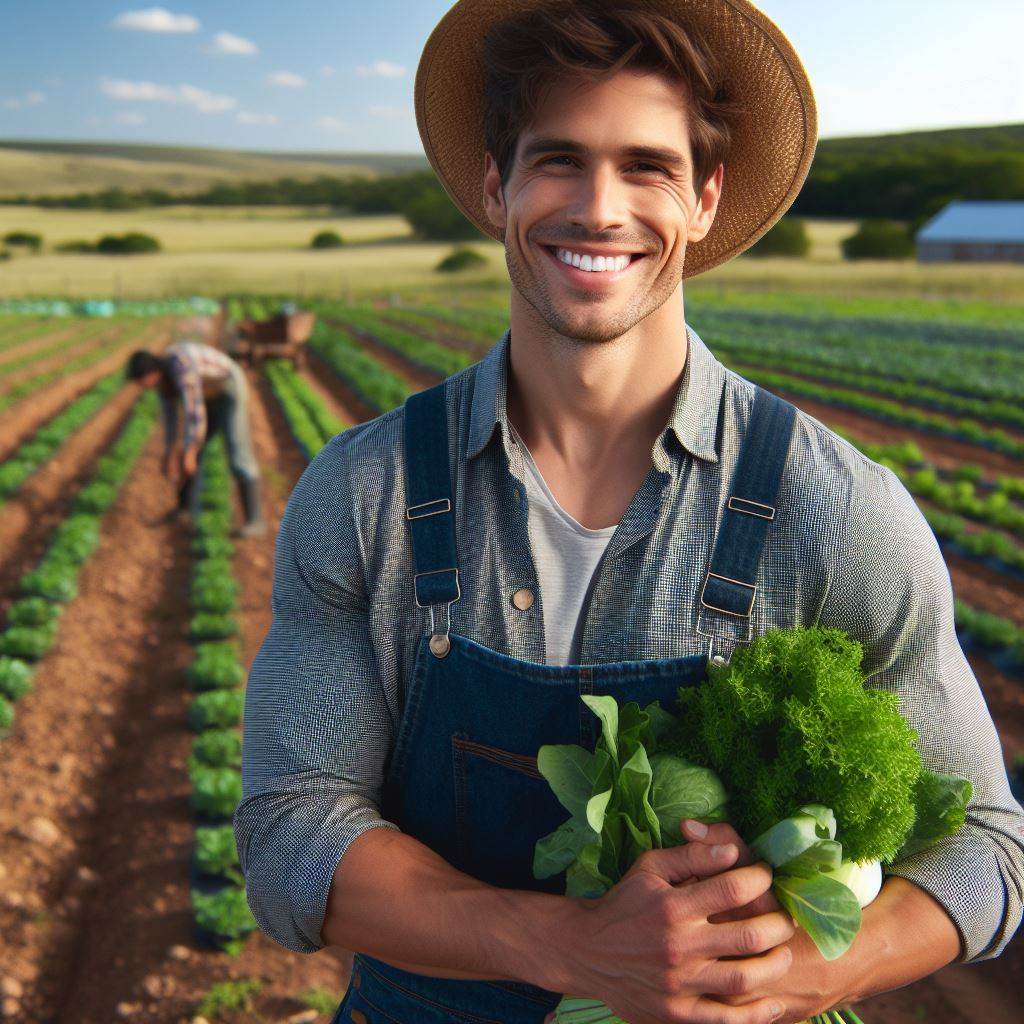Introduction
Women farmers play a significant role in the agriculture industry.
Their resilience is vital to the success and sustainability of farming.
Resilience is the ability to bounce back from adversity and persevere through challenges.
In the demanding world of farming, resilience is crucial for survival.
Women not only face the same difficulties as male farmers but often have additional obstacles to overcome.
They often have to balance their roles as mothers, wives, and caretakers while managing a farm.
Despite these challenges, women demonstrate incredible strength and determination.
They have proven themselves to be resilient and capable of achieving success in the agriculture sector.
This blog section will explore the various aspects of women’s resilience in farming.
It will discuss the unique challenges they face and the strategies they employ to overcome them.
Additionally, it will highlight the significant contributions women make to the farming community and the wider agricultural industry.
By examining the role of women in farming and their journey towards resilience, we can gain a better understanding of their experiences and the importance of gender equality in agriculture.
This section aims to shed light on the grit and perseverance displayed by women farmers and recognize their invaluable contributions.
Historical Overview of Women in Farming
Role of Women in Traditional Farming Practices
Throughout history, women have played a critical role in traditional farming practices.
They were responsible for nurturing the crops, caring for livestock, and maintaining the household.
Challenges and Limitations Faced by Women Historically
Women in farming faced numerous challenges and limitations throughout history.
They had limited access to resources, education, and ownership rights, which hindered their ability to thrive in agricultural endeavors.
Notable Women Who Made Significant Contributions to Farming
Despite the obstacles they faced, several notable women made significant contributions to farming.
Ellen Swallow Richards
Ellen Swallow Richards, a prominent chemist, conducted pioneering research on soil chemistry and agricultural practices, revolutionizing the industry.
Temple Grandin
Temple Grandin, an animal behavior expert, developed innovative livestock handling systems that improved animal welfare and productivity on farms.
Rachel Carson
Rachel Carson, an environmentalist, highlighted the detrimental effects of pesticides on agriculture and sparked a movement towards sustainable farming practices.
Alice Waters
Alice Waters, a renowned chef and advocate for organic farming, popularized the farm-to-table movement, emphasizing the importance of local and sustainable food sources.
Wangari Maathai
Wangari Maathai, an environmental and women’s rights activist, founded the Green Belt Movement in Kenya, which focused on reforestation and empowering rural women through sustainable agricultural practices.
These women, among many others, shattered gender barriers, pushed innovations, and paved the way for women in farming.
Read: Small Farm, Big Debt: A Financial Saga
The Changing Landscape: Women’s Increasing Involvement in Farming
Factors Leading to an Increase in Women Engaged in Farming
As the landscape of farming continues to evolve, women are stepping into the forefront, driving positive change and resilience within the industry.
Factors such as economic shifts, technology advancements, and changing societal attitudes have contributed to the increasing number of women engaged in farming.
With their prominent roles as owners, operators, and decision-makers, women are reshaping the face of agriculture.
Various Roles Women Now Play in Farming
Women’s involvement in farming brings numerous benefits and positive impacts.
The diverse perspectives and ideas they bring help drive innovation and efficiency.
Their unique skills, such as organization and attention to detail, contribute to effective farm management.
Moreover, their emphasis on sustainability promotes environmentally-friendly farming practices.
Aside from the significant contributions they make to farm operations, women’s involvement also extends beyond the fields.
As educators and knowledge-sharers, they empower other farmers and contribute to the growth of rural communities.
Their presence promotes economic development and social cohesion, creating a stronger and more resilient agriculture sector.
Moreover, the increasing representation of women in farming acts as a catalyst for gender equality.
By serving as role models and breaking traditional gender barriers, women inspire other females to embrace farming as a career option.
This leads to broader opportunities and a more inclusive agricultural industry.
Transform Your Agribusiness
Unlock your farm's potential with expert advice tailored to your needs. Get actionable steps that drive real results.
Get StartedPositive Impacts of Women’s Involvement in the Industry
In fact, the changing landscape of farming reflects the increasing involvement of women in the field.
Factors such as economic shifts, advancements in technology, and changing societal attitudes have paved the way for women to take on various roles as owners, operators, and decision-makers.
Their contributions bring positive impacts to the industry, fostering innovation, sustainability, and community development. Women’s resilience has proven instrumental in shaping the future of farming.
Read: Organic Trials: One Farmer’s Shift Story

Resilience in the Face of Challenges
Common obstacles faced by women in farming, such as gender bias and lack of resources
In the male-dominated agriculture industry, women face numerous challenges that hinder their success and growth as farmers.
One major obstacle is gender bias, which manifests in various forms, including unequal pay, limited access to markets, and discriminatory social norms.
Additionally, women often struggle with a lack of resources and support.
They encounter difficulties in securing land ownership and credit, obtaining necessary technical knowledge and training, and accessing modern farming tools and equipment.
These obstacles create a significant disadvantage for women farmers.
How women exhibit resilience in overcoming these challenges
Despite these adversities, women farmers exhibit remarkable resilience and determination in overcoming the barriers they face.
They refuse to let gender bias or lack of resources impede their progress in agriculture.
Women frequently develop innovative and sustainable farming practices that maximize their limited resources and ensure their success.
They actively seek out alternative financing options, networks, and mentorship programs to overcome the financial obstacles imposed upon them.
Moreover, women farmers actively challenge gender bias by organizing themselves into agricultural cooperatives, advocacy groups, and self-help networks.
By collaborating and sharing experiences, they amplify their voices and create spaces for their participation and leadership in the agricultural sector.
Specific examples of women farmers who have showcased exceptional resilience
There are numerous inspiring examples of women farmers who have exhibited exceptional resilience despite the challenges they face.
One such example is Maria, a small-scale farmer from a remote village.
Maria experienced gender bias firsthand when her male relatives doubted her capabilities as a farmer.
Undeterred, she proved herself by successfully implementing sustainable farming practices and demonstrating higher crop yields than her skeptics.
Another example is Fatima, a single mother supporting her family through farming.
Despite facing financial constraints and limited access to resources, she sought out training programs and developed her skills in agribusiness.
Fatima’s perseverance and entrepreneurial spirit allowed her to establish a thriving organic farm.
These women, like many others, serve as inspiring role models for their resilience in the face of adversity.
Their stories highlight the immense potential and contributions of women farmers in building a sustainable and inclusive agricultural sector.
Read: Climate Change: An Alaskan Farmer’s Fight
Empowering Women in Farming
Support and Resources: Essential for Women in Farming
Support and resources empower women, fostering resilience in the challenging field of farming.
Empowering women in farming ensures their voices are heard and their contributions recognized.
Access to education and training equips women with essential skills for successful farming.
Providing financial assistance enables women to invest in their farms and expand operations.
Initiatives, Organizations, and Programs: Driving Change in Farming
Numerous initiatives, organizations, and programs are dedicated to supporting women in farming.
The Women, Food and Agriculture Network (WFAN) empowers women through education and networking.
Heifer International offers training and resources to help women achieve self-reliance in farming.
The USDA’s Women in Agriculture program provides funding and resources for female farmers.
Success Stories: Women Thriving in Farming
Jane Smith, a single mother, transformed her small plot into a thriving organic farm.
With support from local initiatives, Maria Lopez tripled her crop yield and income.
Samantha Brown overcame barriers to become a respected leader in sustainable agriculture.
In short, empowering women in farming is crucial for the resilience and success of the agricultural industry.
Through support, resources, and recognition, women farmers can thrive and contribute significantly to food production and community development.
Initiatives, organizations, and programs play a vital role in driving this empowerment, providing avenues for education, networking, and financial assistance.
The success stories of women who have flourished in farming serve as inspiration and evidence of the transformative impact of empowerment efforts.
As we continue to champion gender equality in agriculture, let us celebrate the grit and determination of women farmers and work towards a more inclusive and sustainable future for farming communities worldwide.
Showcase Your Farming Business
Publish your professional farming services profile on our blog for a one-time fee of $200 and reach a dedicated audience of farmers and agribusiness owners.
Publish Your ProfileRead: Pest Plight: Stories from the Field
Conclusion
In this blog post, we explored the topic of “Grains of Grit: Women’s Resilience in Farming.”
We emphasized the significance of women’s resilience in the farming sector.
It is crucial for readers to appreciate and support women working in the farming industry.
By understanding their resilience and unique contributions, we can uplift and empower women in farming.
Women’s resilience not only helps them overcome challenges but also drives innovation and progress in agriculture.
Let us recognize the tireless efforts of women farmers and acknowledge their vital role in feeding the world.
Through supporting and advocating for women in farming, we can promote gender equality and sustainable farming practices.
It is time for society to recognize and appreciate the grains of grit that women bring to the farming sector.
Together, let us create a future where women farmers are celebrated, supported, and empowered to thrive.
As individuals, we can make a difference by buying from women-owned farms, sharing their stories, and promoting their achievements.
By standing alongside women in farming, we are investing in a brighter and more resilient agricultural industry.
Now is the time to applaud the unwavering spirit and resilience of women in farming and ensure their success.
Let us unite and create an inclusive farming community that cherishes and uplifts women in their pursuit of a sustainable future.
The grains of grit women possess not only sustain our food supply but pave the way for a more equitable world.




